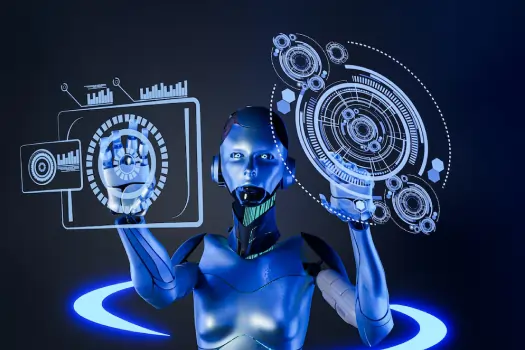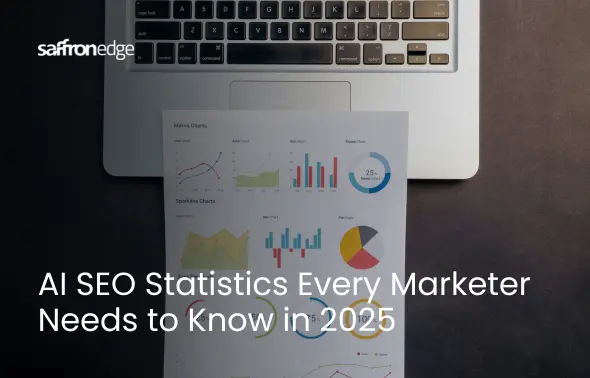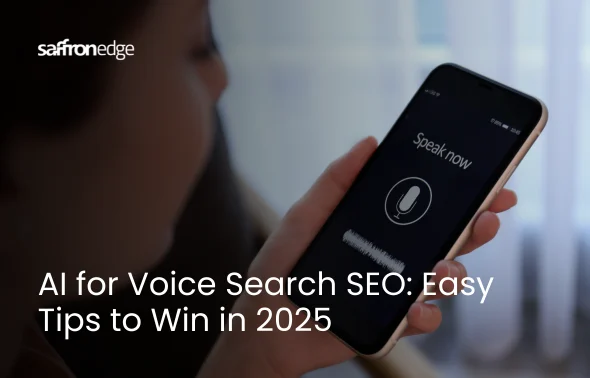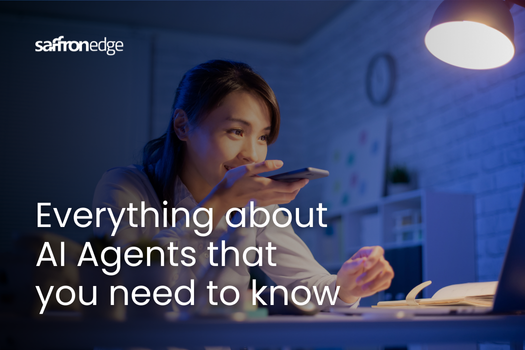Contents
- Know About Artificial Intelligence and Automation
- What is AI Marketing Automation?
- The Role of AI in Marketing Automation
- 7 Reasons Why Marketers Should Embrace AI Marketing Automation
- Top 5 AI Marketing Automation Tools
- Top 5 AI Marketing Automation Tools
- Emerging Trends and Advancements in AI Marketing Automation
- Conclusion
Artificial Intelligence is no longer a buzzword but a game-changer in marketing. We are already halfway through 2024, and AI marketing automation is changing how businesses engage with their customers, enabling personalized experiences at scale.
While many associate AI in marketing primarily with content creation, its applications are far more extensive. From lead scoring and audience segmentation to campaign optimization and predictive analysis, AI is reshaping every aspect of marketing.
This guide will help you in understanding what AI marketing automation is and how it can revolutionize your marketing approach.
Know About Artificial Intelligence and Automation
Automation is a process that involves the use of technology to complete tasks that would otherwise be done manually.
For example, you can pre-schedule a social media post or email campaign at specific times. The key is that humans create the content, and automation tools simply execute the delivery based on pre-set rules.
AI, on the other hand, goes beyond following instructions. t can learn, change, and make decisions based on available data.
AI can generate multiple email subject lines for your upcoming sale, analyzing past performance to craft compelling options. It's not just executing tasks but augmenting human intelligence to create, optimize, and predict outcomes.
What is AI Marketing Automation?
AI Marketing Automation uses artificial intelligence (AI) to streamline and optimize marketing processes.
It involves leveraging AI technologies, such as machine learning and natural language processing, to automate tasks, personalize campaigns, and gain valuable insights.
Take email marketing, for example. AI can craft personalized email content, while automation ensures it's sent at the optimal time for each recipient.
This blend of marketing automation and AI enables marketers to deliver highly targeted, efficient campaigns at scale. However, the real work starts when AI and automation join forces in marketing.
The Role of AI in Marketing Automation
AI is not just making processes faster, but it is making them smarter. Here's how AI is revolutionizing marketing automation:
1. Enhanced Personalization
We live in an era when customers expect tailored experiences. AI marketing automation services & tools make this possible by analyzing large data sets to understand individual preferences and behaviors.
According to McKinsey, fast-growing companies derive 40% more of their revenue from personalization than slower-growing counterparts. The report also states that 71% of customers expect personalized experiences, and 76% get frustrated when personalization is lacking.
2. Predictive Analytics
AI excels at identifying patterns and making predictions. This translates to forecasting customer behaviors, anticipating trends, and optimizing marketing campaign strategies.
By leveraging AI-driven predictive analytics, marketers can make data-informed decisions that drive better results. The predictive AI market is forecasted to reach $108 billion by 2033 , with sales and marketing holding 21% of the market share.
3. Content Creation and Curation
AI content marketing automation tools can generate written content, from product descriptions to blog posts.
They can also develop relevant content from across the web, saving marketers valuable time while ensuring a steady stream of engaging material for their audience. 65% of marketers reported improved SEO due to AI, while 68% of businesses saw better content marketing ROI.
4. Ad Targeting and Optimization
AI marketing automation makes this possible by processing large volumes of data to determine the customer’s preferences and actions. AI-powered ad platforms can adjust bidding strategies, ad creatives, and targeting parameters in real-time, maximizing ROI and campaign performance.
5. Customer Segmentation
AI can segment customers based on the data collected to create different categories depending on the parameters set, including demographic, behavioral, and preference. This also helps the marketers address each group in a way that will appeal to them, enhancing the campaigns' effectiveness.
6. Chatbots and Virtual Assistants
AI-powered chatbots and virtual assistants engage with customers in real-time, providing personalized support and improving the overall customer experience. They operate 24/7, reducing response times and letting human agents handle more challenging tasks.
A survey done by Statista revealed that in 4 out of 10 cases , chatbots perfectly answered customer questions, and they've been shown to increase business sales by 67%.
7 Reasons Why Marketers Should Embrace AI Marketing Automation
As the digital world demands more time and resource management, AI marketing automation is no longer a luxury but a necessity. Marketers adopting this combination of marketing automation and AI can build marketing automation strategies that further streamline their efforts, enhance customer engagement, and drive better results.
1. Improved Efficiency
Marketing automation , through the use of artificial intelligence, helps reduce tasks and handle repetitive tasks, enabling the marketer to focus on the strategic and creative parts. This increase in efficiency can translate into substantial time and cost savings.
In a HubSpot survey, 79% of salespeople using AI and automation reported that it saves them time.
2. Data-Driven Insights
As we discussed above, AI algorithms can process vast data and provide useful information for decision-making. This helps marketers make better decisions and enhance the effectiveness of their campaigns.
3. Personalization at Scale
With AI, delivering personalized experiences to individual customers becomes possible at scale. This level of personalization can significantly boost engagement and conversion rates. Accenture found that 92% of customers interested in personalized products are willing to share their data, making personalization even more achievable.
4. Continuous Optimization
AI marketing tools use machine learning to continuously optimize campaigns in real time. By analyzing performance metrics and user interactions, these tools can automatically adjust various elements to maximize effectiveness.
5. Improved Customer Engagement
Chatbots and virtual assistants integrated with AI help offer immediate and customized customer service, increasing customer satisfaction levels.
6. Predictive Capabilities
AI enables marketers to anticipate future trends, customer behaviors, and market dynamics more accurately. This foresight allows for proactive strategy development and execution. McKinsey reported that 63% of companies using AI saw at least a 5% increase in annual revenue. Businesses that leverage AI-driven marketing automation gain a significant edge over their competitors.
By leveraging marketing automation specialists , businesses can improve efficiency, enhance customer experiences, and drive better results.
Top 5 AI Marketing Automation Tools
1. HubSpot
HubSpot offers an all-in-one marketing automation platform with AI-powered features for lead scoring, email personalization, and customer segmentation. Its robust CRM integration makes it ideal for businesses of all sizes.
2. Marketo Engage
Marketo Engage , part of Adobe Experience Cloud, uses AI to optimize email campaigns, segment audiences, and predict customer behavior. It's a comprehensive solution for B2B marketing automation.
3. ActiveCampaign
ActiveCampaign combines AI-driven marketing automation with CRM and email marketing. It offers predictive content, automated workflows, and dynamic segmentation, making it a great choice for SMBs.
4. Salesforce Pardot
Pardot by Salesforce is designed for B2B marketers. It offers AI-powered tools for lead management, email automation, and campaign analytics. It integrates seamlessly with Salesforce CRM for a unified approach.
5. Mailchimp
Mailchimp provides AI-powered marketing automation for small—and medium-sized businesses. Its features include personalized email campaigns, predictive insights, and audience segmentation. Its user-friendly interface makes it accessible for beginners.
Top 5 AI Marketing Automation Tools
1. Define Clear Goals and Objectives
Start by outlining what you want to achieve with AI marketing automation. Whether it's improving campaign performance, enhancing customer engagement, or driving revenue growth, having clear objectives will guide your implementation efforts.
2. Assess Your Data Quality and Accessibility
AI thrives on data. Ensure you can access high-quality data from various sources, including customer interactions, website behavior, and transactional data. Assess the quality and completeness of your data to ensure it's suitable for training AI algorithms.
3. Choose the Right AI Marketing Tools
Find AI content marketing automation tools that align with your goals and budget. Consider factors like scalability, integration capabilities with your existing systems, and advanced features such as predictive analytics and personalization.
4. Train Your Team
Educate your marketing team on the new AI tools and platforms to ensure they understand how to use them effectively. Make sure they can leverage AI-driven features and insights to optimize campaigns and strategies.
5. Start Small and Iterate
Begin by implementing AI marketing automation in a specific area, such as email marketing or lead scoring. Start small, gather feedback, and refine your approach based on results. Gradually expand your use of AI as your team becomes more comfortable with the technology.
6. Focus on Customer Experience
Leverage AI to deliver personalized experiences across all customer touchpoints. Use AI algorithms to segment your audience, tailor marketing messages, and optimize customer journeys for maximum engagement and conversion.
7. Monitor Performance and Adapt
Continuously track the performance of your AI-driven marketing initiatives. Track key metrics like engagement rates, conversion rates, and ROI. Use these insights to identify areas for improvement and optimization.
Emerging Trends and Advancements in AI Marketing Automation
1. Advanced Ad Targeting
With major search engines incorporating AI into their ad platforms, marketers can expect more precise targeting capabilities. AI-powered algorithms will help choose the optimal placement, timing, and creative elements for ads.
2. Advanced Chatbots
Significant investments in conversational AI startups indicate that chatbots will become even more advanced. Future chatbots may handle complex tasks like processing payments or placing orders, further enhancing customer service capabilities.
3. Accurate Predictive Analysis
AI-driven predictive analysis is set to become more accurate and widespread, helping companies forecast sales trends and make data-informed decisions with greater confidence.
4. Multimodal AI
The rise of multimodal AI, which combines different AI models, will lead to more versatile tools. For instance, we'll see more generative AI tools that can create text and visuals, offering marketers a one-stop solution for content creation. 63% of marketers believe that most content will be created using generative AI in the future, with 81% stating that AI-generated content is on par with or better than human-created content.
Conclusion
In conclusion, AI in marketing isn't just a trend but the future. It allows marketers to make their campaigns more accurate, smooth, and powerful, making a stronger impact on their audience. With AI, personalized suggestions and improved campaigns automatically help marketers work smarter and achieve more.
But it's important to remember that AI is here to support human creativity and strategic planning, not to take over.
Rank in AI Overviews
Frequently Asked Questions
1. How can AI marketing automation improve customer segmentation?
AI algorithms analyze large datasets to identify patterns and trends, allowing for more accurate and dynamic customer segmentation, which leads to more targeted and relevant marketing efforts.
2. Can small businesses benefit from AI marketing automation, or is it only for large enterprises?
Small businesses can greatly benefit from AI marketing automation by automating repetitive tasks, optimizing resource allocation, and competing more effectively with larger companies through personalized and data-driven marketing strategies.
3. What are some common challenges when implementing AI marketing automation, and how can they be overcome?
Common challenges include data integration, tool selection, and staff training. These can be overcome by starting with a clear strategy, choosing scalable solutions, and investing in ongoing education for your team.
4. How do I choose the right AI marketing automation tools for my business?
Consider your business size, goals, and existing tech stack. Look for tools that offer scalability, integration capabilities, and robust analytics to ensure they align with your overall marketing strategy and objectives.
5. How does AI marketing automation enhance content personalization?
AI analyzes user behavior, preferences, and interactions to deliver highly personalized content recommendations across channels, increasing engagement and improving customer experiences.
6. What role do chatbots play in AI marketing automation?
Chatbots, powered by AI, automate customer interactions, provide instant responses, and gather valuable data. This enables personalized communication and frees up resources for more strategic tasks.
7. Is AI marketing automation compatible with existing CRM systems?
Most AI marketing automation tools are designed to integrate seamlessly with existing CRM systems, enhancing data synchronization, customer insights, and overall campaign effectiveness.
8. What metrics should I track to measure the success of AI marketing automation?
Key metrics include customer engagement rates, lead conversion rates, ROI, campaign performance, and customer satisfaction scores, which help gauge the effectiveness of your AI-driven marketing efforts.
9. What should be taken care of when implementing marketing automation and AI?
When implementing marketing automation and AI, ensure you define clear objectives, maintain high-quality data, and choose tools that align with your needs. Start small to test effectiveness and prioritize personalization while keeping human oversight for critical decisions.
Related Blogs
We explore and publish the latest & most underrated content before it becomes a trend.

Subscribe to Saffron Edge Newsletter!

Rank in AI Overviews








